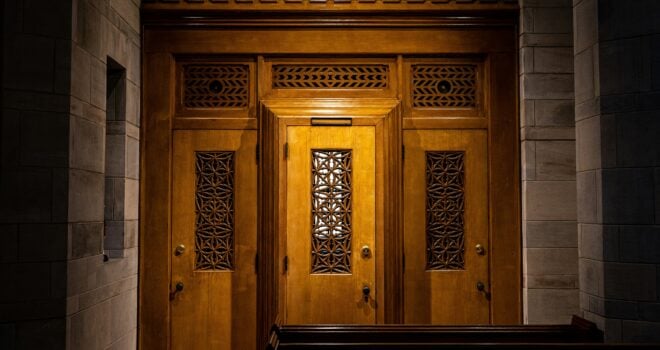John went throughout the whole region of the Jordan, proclaiming a baptism of repentance for the forgiveness of sin.
I attended a seminar on the promotion and formation of religious and priestly vocations some years ago. The attendees were all involved in fostering vocations in religious communities and dioceses. One of the speakers said to us, “You guys are all inviting young men and women to enter your seminaries and convents to become priests, brothers, and nuns. I hope that you are calling them to repentance first. I also hope that you are good examples of ongoing repentance for them.” I recall how his bold statement left an uncomfortable silence in the room.
The speaker gave us a memorable challenge: we are to be examples of repentance first, before calling all others to repentance. We must live a lifestyle of repentance before cultivating a climate of repentance in our religious communities and dioceses. Without calling others to repentance and being good examples of it ourselves, we cannot expect others to have the faith to perceive, receive, and respond to the gift of vocation that God is offering to them.
John the Baptist is an example of a person who lived out this challenge faithfully. He first lived a lifestyle of repentance. Everything about him was penitential. He lived in a desert devoid of the pleasures, comforts, and securities of a city. Though the desert symbolizes a place of constant temptations and trials, it also symbolizes a place of constant silent prayer and solitude with God. The Baptist’s clothes were penitential as was his food; “John wore clothing of camel’s hair with a leather belt around his waist, and his food was locusts and wild honey” (Mt 3:4).
John successfully called all persons to repentance as well. His entire ministry was about bringing people to repentance in preparation for the messiah: “John went throughout the whole region of the Jordan, proclaiming a baptism of repentance for the forgiveness of sin” (Lk 3:3). He called soldiers, prostitutes, tax collectors, and even the Pharisees and Sadducees to repent. He even had the courage to call the adulterous King Herod and his married mistress to repentance for their adulterous and scandalous relationship, telling the king, “It is not lawful to have her as your wife” (Mt 14:3).
His fidelity to repenting and calling all to repent disposed him to receive all that God was offering to him in his prophetic ministry. God gave him the powerful words he spoke: “The word of God came to John the son of Zachariah in the desert.” He received the grace to be selfless in his ministry, having enough humility to say about Jesus, “He must increase, while I must decrease” (Jn 3:30). He did not give in to pride or vainglory because of his successful ministry but simply referred to himself as “the voice of one crying out in the wilderness” (Jn 1:23).
Lastly, he received the grace to lay down his life for the truth of the Gospel. Though his fidelity to repentance and boldness in calling all to repent eventually cost him his life, it also earned him the praise and affirmation from Jesus who called him “a bright and shining lamp” (Jn 5:35), a uniquely resilient prophet who was nothing like “a reed shaking the wind” (Mt 10:7).
John’s faithfulness in personal repentance and exhortation to others was also a blessing to them. Though his baptism could not bring about forgiveness of sin, it predisposed the recipients for the repentance and forgiveness that Christ alone brings. Only those who received the baptism of John were prepared to believe in Jesus and to receive the amazing gifts that He brought.
St. Paul shows us the depth of God’s forgiveness by calling all to conversion through personal and communal repentance. Writing from his incarceration, he demonstrates constant joy: “I pray with joy in my heart for all of you.” He exudes strong hope even in his suffering, writing, “I am confident of this, that the one who began a good work in you will continue it to complete it until the day of Christ Jesus.” He forgets himself to encourage others: “This is my prayer: that your love may increase more and more.” He gave faithful witness to Jesus, “Filled with the fruit of righteousness that comes through Jesus Christ for the glory and praise of God” (Phil 1:4-11).
My dear brothers and sisters in Christ, the Catholic Church is meant to be a community of repentant sinners, incessantly inviting all to constant repentance in preparation for the glorious return of our Lord Jesus Christ. We repent through the frequent and fruitful reception of the sacrament of Reconciliation. We return to full communion with God and others through the Eucharist. Divine forgiveness and reconciliation are not lacking in the Church. This is why the Church is rightly called a universal sacrament of salvation.
Sadly, we seem to have ignored our vocation to be examples and heralds of ongoing repentance to others. Many have adopted some of the disastrous secular attitudes towards sins that prevail today. We pretend that we do not have sins or even try to hide our sins by doing other good deeds. We pretend that our sins are “not too bad” or that they are even now good and acceptable. We can justify ourselves by buying into the “everybody-is-doing-it” mentality. We compare ourselves with others and think we are better than them. Then there is the absurd attitude of celebrating our sins in our Gay Pride parades.
We also fail to call others to repentance too because, for many of us, the highest virtues have become being tolerant, non-judgmental, inclusive, and accepting of everything. We dread to stand alone for the truth, and we do not want to earn the ire of the majority. We find it easier to cover-up sins instead of bringing all to the light of truth. And we definitely don’t want to risk being accused of bigotry or rigidity when we condemn sin in any form.
The Church becomes spiritually impotent when she fails to be a community of repentant sinners inviting others to join her in repenting and turning back to God. Maybe this is why all our appeals for young people to respond to a religious or priestly vocation fall on deaf ears and hardened hearts. They may be called by God, but our words lack spiritual power because they do not flow from truly repentant hearts. We need to go deeper in our own repentance, be more consistent in repenting, and more faithful and courageous in inviting others too.
It is not enough for us to just call people to discern a vocation to the priesthood or religious life, or even to marriage. Let us begin with ourselves. Look closely at Jesus and note the exact areas of repentance in our lives. By His grace, let us respond to His loving invitation. He is never tired of forgiving us. So, let us never get tired of repenting and returning to Him.
Having cultivated such a lifestyle of repentance, we can then invite all people to repentance. This is how all of us can perceive, receive, and respond to the amazing gifts that Christ alone brings, especially the gift of vocation.
Glory to Jesus!!! Honor to Mary!!!
Photo by Nick Castelli on Unsplash












